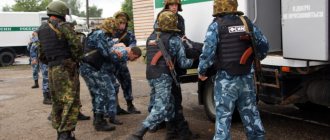A criminal act or even the imposition of a criminal penalty for a crime does not always entail immediate prosecution.
Often, due to certain life circumstances of the convicted person or his physical characteristics, the process of execution of the sentence is postponed indefinitely. In legal science and practice, this phenomenon is called deferment of serving a sentence (Article 82 of the Criminal Code of the Russian Federation).
The article clearly regulates a number of grounds for the possibility of applying a deferment in relation to those convicted of criminal offenses.
But is it so easy to achieve a deferment, and what types of crimes can such a criminal law measure not apply to?
Suspended sentence
Initially, in Russian law, deferment in criminal cases was applied only to women since 1992. Men have been involved in this measure only since 2010.
Deferment of execution of a sentence is one of the measures of a criminal law nature, which is the non-involvement of a convicted person in the execution of a sentence due to its inexpediency and it is impossible to have the desired positive effect at the moment.
Simply put, a deferment is a free period of time during which the convicted person is obliged to resolve certain issues in his life that prevent the execution of the sentence.
The basis of deferment of punishment is the principle of humanism . The legislator assumes that by depriving a criminal of his freedom, he may infringe on the interests of his family members who need his support.
A deferment of execution of a sentence can be applied both at the stage of sentencing and already in the process of serving the type of punishment approved by it.
Conditions for applying the deferment
Article 82 of the Criminal Code of the Russian Federation provides for such a measure of mitigation of punishment only in relation to persons with dependent children under 14 years of age, or women in a state of pregnancy. This is the first type of convicts to whom a deferment can be applied.
The second type of group of convicts for whom a deferment is allowed is presented in Art. 82.1 of the Criminal Code of the Russian Federation. These are people suffering from drug addiction and who have expressed a desire to undergo treatment.
Moreover, each of the presented categories has its own characteristics, the presence of which provides the opportunity to apply for a deferment.
Deferment of serving sentences for pregnant women
Pregnancy, regardless of its duration, may serve as a basis for granting a deferment of punishment.
After the birth of a child, in the case where no one else can raise him, and if the convicted woman is interested in this process, the deferment will be extended until the newborn reaches 14 years of age.
Deferment of punishment is not the duty of the court, but its right. Therefore, the initiative for such a measure of probation before the actual serving of the sentence should come from the convicted person herself.
If the expectant mother does not have normal conditions for maintaining and raising a newborn, the court will not apply a deferment.
Can only be applied to correctional and compulsory labor, restriction of freedom, arrest and imprisonment. In this case, imprisonment should not exceed 5 years for serious or especially serious crimes.
If the pregnancy is terminated, the suspension of punishment will be immediately canceled.
Deferment of punishment until the child reaches 14 years of age
In addition to pregnant women, women and men who have a child under 14 years of age have the right to receive a deferment . They must be the only guardian capable of ensuring the upbringing of the child.
An obstacle to obtaining a deferment if you have young children may be one of the following:
- They were sentenced to restriction or imprisonment for crimes against sexual integrity against children under 14 years of age;
- They were sentenced to imprisonment for more than 5 years for grave and especially grave criminal acts against the person;
- They have committed terrorist crimes and related criminal acts.
The deferment can only be applied to those convicted persons who have not abandoned the child and are raising him.
The implementation of the deferment of punishment is monitored by the penal inspection, whose employees, after repeated warnings to the convicted person about his failure to fulfill parental responsibilities, can apply to the court with a petition to cancel the deferment of punishment.
Failure to fulfill parental responsibilities involves the following behavior:
- The child was abandoned in an orphanage or maternity hospital;
- The convicted person leads an antisocial lifestyle and does not care for the child;
- The convicted person left the child with relatives or strangers without good reason;
- The convict is deliberately hiding.
When the child turns 14 years old, the court has the right to release the convicted person from execution of the sentence with the criminal record expunged or replace it with a more lenient one.
In a situation where the term of execution of the sentence has ended earlier than the period of deferment of its execution, the court may terminate the period of deferment early.
To do this, he must make sure that the convicted person has reformed, fully complied with parental obligations and is not dangerous to society.
All this information is clarified by employees of the criminal-executive inspection.
Deferment of serving sentences for drug addicts
Article 82.1 of the Criminal Code of the Russian Federation regulates the legal features of granting a reprieve to convicted drug addicts. In order to obtain such a right to defer punishment, it is necessary, first of all, the voluntary desire of the drug addict himself.
Drug addiction is a disease. That is why a reliable doctor’s opinion on the presence of addiction is necessary so that a deferment of punishment can be granted due to illness.
The convicted person must undergo addiction treatment and a rehabilitation course during the reprieve. In this case, his imprisonment will be suspended.
The maximum period of rehabilitation for drug addiction cannot exceed five years.
If a drug addict, already in the process of treatment or rehabilitation, decides to refuse to continue taking the course, the deferment for him will be cancelled.
Such a presentation will be sent to the court by employees of the criminal-executive inspection after repeated warnings to the convicted person. As soon as the court order to cancel the deferment comes into force, the unfortunate drug addict will be immediately closed.
To be released from punishment after completing a course of rehabilitation and treatment, it is necessary that remission be maintained for two years.
If, during the reprieve, the convicted person breaks the law again, the reprieve will be canceled and the execution of the sentence will take effect.
Everything about criminal cases
Deferment of sentencingUrl Additional information:
— clause 8, part 1 299 of the Code of Criminal Procedure
When passing a sentence, the court decides whether to grant a reprieve
— clause 2, part 1, 398 Code of Criminal Procedure
deferment of execution of a sentence with a child under 14 years of age
- The first stage at which a deferment can be granted is the sentencing stage.
- if the petition is filed during the trial, then the court is obliged to consider this issue and include in the verdict a clause stating what decision was made ( clause 8, part 1, 299 of the Code of Criminal Procedure
).
- technical nuance: the position of the prosecutor - in practice, when the defense demands a deferment precisely at the sentencing stage, prosecutors never agree with this, and argue their disagreement like this: “ I believe that the issue of deferment should not be resolved now, but at the execution stage sentence
". You can call it tradition.
Normative base
—
clause 8, part 1, 299 of the Code of Criminal Procedure,
when passing a sentence, the court decides whether to grant a reprieve
—
clause 2, part 1, 398 of the Code of Criminal Procedure
, deferment of execution of a sentence with a child under 14 years of age
When exactly to file a petition?
?
Question
: At what point in the trial should we petition the judge?
The trial process is quite long, there are several stages: opening hearing, judicial investigation, debate. When to submit a petition?
The best moment
Url Additional information:
— Part 1 291 Code of Criminal Procedure
last moment at the end of the judicial investigation (question asked)
- it is most correct to do this at the end of the judicial investigation, at the moment provided for in Part 1 291 of the Code of Criminal Procedure
, when, before moving on to the debate, the judge asks the question “do the parties have any additions to the judicial investigation? "
- at this moment we turn to the judge “Your Honor, there is a motion”;
- then we submit a written petition and attachments to it through the bailiff.
Question
: Is it possible to apply earlier or later?
In principle, this is not prohibited, it is just less competent.
Url Additional information:
— Part 1 271 Code of Criminal Procedure
first moment at the beginning (asks about motions)
a) can be stated in the preparatory part of the court hearing, at the time provided for in Part 1 271 of the Code of Criminal Procedure
when the judge asks "are there any parties to the motion?"
But this, although it does not violate anything, is too early. This moment itself is intended for other petitions: for those that are related to the judicial investigation (summoning witnesses, experts).
The judge may even reject the motion by simply saying “file it later, now is not the time.”
b) can also be submitted during the debate. But it is also illiterate. After all, the judge will have to study the petition, the materials, and transfer it to the prosecutor for study. This is all inappropriate for the debate stage. Of course, the judge cannot refuse to accept the petition, but why cause his annoyance?
Appeal
Url Additional information:
- paragraph 20
Plenum No. 26 any type of mitigation is possible in an appeal
If the trial court refused to grant a deferment, can the appellate court correct this? Yes, this is possible, according to paragraph 20
Plenum No. 26 in an appeal, any mechanism for mitigating the situation of the convicted person can be used.
Cassation
In cassation everything is more complicated. No, the court of cassation has the power to consider the court’s refusal to defer unfounded and change this decision. But here the probability is lower, because the verdict has already entered into force. This means that the possibility of proceedings in execution of the sentence has already been activated (Chapter of the Criminal Procedure Code). That is, at the cassation stage there is already a different, parallel legal mechanism.
Hidden danger
It is important for legal practitioners to know one more nuance: including a request for a deferment in a cassation appeal can be harmful. About it here: Danger
application for a deferral at the cassation stage.
Petition for deferment of sentence
If the convicted person does not submit a request for a deferment of punishment, then he may not exercise his legal right to receive it. The court itself is not obliged to apply it to convicted persons.
This document can be drawn up by the convicted person himself or he can entrust this work to his defense lawyer.
So, the application must necessarily include the following information:
- The name of the judge and the name of the court in which the petition is being filed;
- Applicant details: full name, place of serving the sentence, international address and telephone number;
- Description of the circumstances of the criminal case with reference to the imputed article of the Criminal Code of the Russian Federation;
- Explanation of life circumstances requiring deferment, with documentary evidence;
- Description of the necessary living conditions for the child, availability of work or in case of illness - information confirming its fact;
- With reference to Article 82 or Article 82.1, explain the right to receive a deferment of execution of a sentence;
- List of attached documents, the number of which directly depends on the positive outcome of the application;
- Date and signature of the applicant or lawyer with his participation.
The court is obliged to either accept the petition for consideration or reject it within 10 days.
When the judge makes a decision to grant a deferment, the convicted person will need to appear at the criminal-executive inspection at his place of residence, for which he will first fill out an obligation to appear in court.
After this, he is obliged to comply with all the requirements of the inspection regarding the regime and nature of life in freedom. You need to work, regularly report to the inspection and lead a social lifestyle.
judge Shevtsova E.N. case No. 22-3886/2019
APPEAL DECISION
Volgograd September 12, 2022
Volgograd Regional Court composed of
presiding judge Epifanova A.N.
.
,
judges Chenegina S.A. and Bulycheva P.G.,
when keeping the minutes of the court session by assistant judge Sakharova E.E.,
with:
prosecutor of the appeal department of the prosecutor's office of the Volgograd region S.A. Zakharova,
convicted Uymanova E.G.
.,
lawyer Frolov A.V.
considered in open court the appeal presentation of the Mikhailovsky interdistrict prosecutor of the Volgograd region O.Yu. Tsygankov, the appeal and additions to it by lawyer A.V. Frolov. in defense of the convicted Uymanov E.G. on the verdict of the Mikhailovsky District Court of the Volgograd Region dated May 31, 2022, according to which
Uymanov E. G.
, <…….>,
convicted:
according to Part 2 of Art. 199.2 of the Criminal Code of the Russian Federation to 2 years of imprisonment to be served in a general regime correctional colony.
The term of serving the sentence was decided to be calculated from DD.MM.YYYY, with the time of detention in custody from DD.MM.YYYY counted towards the term of serving the sentence until the day the sentence entered into legal force at the rate of one day for one and a half days of serving in a general regime correctional colony.
Preventive measure against Uymanov E.G. changed to custody, taken into custody in the courtroom.
The issue of physical evidence has been resolved.
After hearing the report of Judge S.A. Chenegina on the circumstances of the case, the arguments of the appeal presentation, the appeal, additions to it, having heard the opinion of the prosecutor S.A. Zakharova, who supported the arguments of the appeal presentation and asked to change the sentence convicted of E.G. Uymanova. via videoconference and his defender A.V. Frolov, who supported the arguments of the appeal, asked to change the sentence, apply the provisions of Art. 73 or 82 of the Criminal Code of the Russian Federation, court
installed:
according to the verdict Uymanov E.G. found guilty of concealing funds from the NGO “<…….>” for a total amount of <…….> rubles, at the expense of which, in the manner prescribed by the legislation of the Russian Federation on taxes and fees, the arrears of taxes, fees, and insurance must be collected contributions in the amount of <…….> rubles, that is, in an especially large amount.
The crime was committed in the period from DD.MM.YYYY to DD.MM.YYYY at <address> under the circumstances set out in the verdict.
At the court hearing, Uymanov E.G. He fully admitted his guilt in committing the crime.
In the appeal submission, Mikhailovsky Interdistrict Prosecutor of the Volgograd Region Tsygankov O.Yu.
considers the sentence illegal and subject to change due to the incorrect application of criminal law. Indicates that Uymanov E.G. During the preliminary investigation, he partially admitted guilt in committing the incriminated crime; the criminal case against him was considered in accordance with the general procedure, but the court of first instance, when imposing punishment on Uymanov E.G. applied the provisions of Part 5 of Art. 62 of the Criminal Code of the Russian Federation, regulating the procedure for imposing punishment on a person whose criminal case was considered in the manner prescribed by Chapter. 40 of the Code of Criminal Procedure of the Russian Federation, namely in a special order. He asks to change the sentence, to exclude, when assigning punishment, the indication of the application of the provisions of Part 5 of Art. 62 of the Criminal Code of the Russian Federation.
In the appeal and additions to it, lawyer A.V. Frolov in defense of the convicted Uymanov E.G.
considers the sentence illegal, unfounded, and the sentence assigned to Uymanov E.G. punishment is unfair. Comes to the conclusion that when imposing the punishment, the court did not take into account that Uymanov E.G. we have no previous convictions, are not registered with narcologists or psychiatrists, are characterized exclusively positively at the place of residence and place of work, have been repeatedly rewarded with certificates and thanks, are the father of four children with many children, date of birth DD.MM.YYYY, and in relation to the full name -1, DD.MM.YYYY year of birth, he is the only parent, voluntarily reported the crime and actively contributed to its solution, gave truthful confessions during the preliminary investigation, petitioned for a verdict without a trial, admitted his guilt completely, repented of his crime , partially repaid the damage caused by the crime; no aggravating circumstances were established. Believes that the provisions provided for in Part 2 of Art. 43 of the Criminal Code of the Russian Federation, the goals of punishment were achieved, since Uymanov E.G. I'm already on the path to correction. Please note that the latter suffers from a number of chronic diseases. He notes that his wife is currently on maternity leave to care for an infant child and needs the help of her spouse, and therefore the appointment of E.G. Uymanov. punishment in the form of actual imprisonment will negatively affect the living conditions of his family. Comes to the conclusion that the court has grounds for applying E.G. Uymanov. deferment from serving the sentence until his son reaches the age of fourteen, full name-1, DD.MM.YYYY year of birth. He believes that the court of first instance did not motivate the impossibility of appointing E.G. Uymanov. a more lenient punishment, not associated with actual imprisonment. Taking into account information about the person, mitigating circumstances, the absence of aggravating circumstances, the impact of the imposed punishment on the correction of the convicted person and on the living conditions of his family, he asks to change the sentence and apply it to E.G. Uymanov when sentencing. provisions of Art. 73 of the Criminal Code of the Russian Federation or provide a deferment from serving the imposed sentence until his son reaches the age of fourteen, full name-1, DD.MM.YYYY year of birth.
After listening to the participants in the process, checking the materials of the criminal case, discussing the arguments of the appeal, the appeal, and additions to it, the appellate court comes to the following conclusion.
The consideration of the criminal case was carried out by the court in accordance with the provisions of Chapter. 36 of the Code of Criminal Procedure of the Russian Federation, which defines the general conditions of the trial, as well as Ch. 37- Ch. 39 of the Code of Criminal Procedure of the Russian Federation, which determine the procedure for considering a criminal case.
Neither during the preliminary investigation nor during the trial of the case were there any violations of legal requirements leading to the reversal or modification of the sentence. The court's conclusions are motivated and based on comprehensively, fully and objectively verified evidence, collected in compliance with procedural norms and not raising doubts.
The conclusion of the court of first instance that the guilt of Uymanov E.G. has been proven. in committing the crime for which he was convicted, corresponds to the factual circumstances of the case established by the court, is confirmed by the totality of the evidence examined at the court hearing, given in the verdict, including: the confessional testimony of E.G. Uymanov himself, given by him at the preliminary investigation and in the trial meeting, testimony of a representative, full name 41., witnesses, full name 14, full name 15, full name 16, full name 17, full name 18, full name 19, full name 20, full name 21, full name 22, full name 23, name-24, name-25, name-26, name-27, name-28, name-29, name-30, name-31 (individual private farm enterprise name-31), name-32, name-33 (individual entrepreneur name- 33), full name-34, full name-35, full name-36, full name-37, full name-38 (directors of JSC “<…….>”), full name-39 (directors of LLC “<…….>”), full name -40 (IP name-40), name-13 (personnel name-13), name-7 (personnel name-7), name-8 (director of LLC “<…….>”), name-9 (chief accountant LLC “<…….>” and a representative of the individual entrepreneur Head of Peasant Farm, name 10), name 11 (directors of LLC “<…….>”), name 12 (directors of LLC “<…….>”), name 2 (lawyer of LLC “<…….>”), name-3 (general director of LLC “<…….>”), name-4, name-5 (director of ANO “<…….>”), name- 6 (General Director of ANO “<…….>”), as well as written evidence given in the verdict, including: a conclusion on the study of documents regarding LLC “<…….>” dated DD.MM.YYYY; analysis of the current account statement of LLC “<…….>”; decision No. <...> on bringing to justice for committing a tax offense dated DD.MM.YYYY; seizure protocols; protocols of inspection of objects and documents, other evidence, a detailed analysis of which is given in the descriptive and motivational part of the verdict.
The court of first instance, having examined and assessed all the collected evidence in its entirety, gave it a proper assessment in accordance with Art. 17, 88 of the Code of Criminal Procedure of the Russian Federation, and gave reasons for which he recognized the evidence underlying the guilty verdict as reliable, corresponding to the established factual circumstances of the case, and also indicated the reasons for which he accepted some evidence and rejected others. In accordance with the requirements of the law, each of the evidence is assessed from the point of view of relevance and admissibility, and the totality of evidence from the point of view of sufficiency to resolve the criminal case, while the relevance, reliability and admissibility of the evidence underlying the verdict does not raise doubts in the appellate court, since they collected in the case in compliance with the requirements of Art. Art. 74, 84 and 86 of the Code of Criminal Procedure of the Russian Federation.
This and other evidence was comprehensively, fully and objectively examined by the court. The court's assessment of the evidence does not contradict the case materials and there are no grounds for recognizing it as erroneous. The court's conclusions set out in the verdict are based only on the evidence examined during the trial and correspond to them.
In addition, the proof of the guilt of Uymanov E.G. and the qualification of his actions on appeal are not disputed.
Having analyzed the above and other evidence set out in the verdict, the court of first instance came to the correct conclusion that it was sufficient to make a decision on the guilt of the convicted Uymanov E.G. in the deed and correctly qualified his actions under Part 2 of Art. 199.2 of the Criminal Code of the Russian Federation.
Punishment for Uymanov E.G. appointed under the sanction of the relevant article of the Criminal Code of the Russian Federation, in compliance with the requirements of Art. 6, 60 of the Criminal Code of the Russian Federation, taking into account the nature and degree of public danger of the crime, the actual circumstances of the case, data on the personality of the convicted person, who is characterized positively at his place of residence and place of work, is not registered with a psychiatrist or narcologist, mitigating circumstances, what active contribution to the detection and investigation of the crime, admission of guilt, repentance for the deed, state of health, presence of minors and minor children, voluntary partial compensation for property damage caused as a result of the crime, as well as the fact that he is the father of many children, the absence of aggravating circumstances were recognized.
Having assessed all the above circumstances together, the court reasonably came to the conclusion that it was impossible to correct the convicted person without isolating him from society, and did not see any grounds for applying the provisions of Part 6 of Art. 15, art. 64, 73 of the Criminal Code of the Russian Federation, properly motivating their conclusions. The appellate court does not find such grounds either.
The conclusions of the court of first instance that the correction of Uymanov E.G. is not possible without actually serving the sentence, are convincing, and do not raise doubts in the appellate court.
At the same time, the court’s conclusion that there are no grounds for applying the provisions of Art. 82 of the Criminal Code of the Russian Federation is not justified and not motivated in the verdict.
By virtue of Part 1 of Article 82 of the Criminal Code of the Russian Federation, for a convicted man who has a child under the age of fourteen and is the only parent, the court may defer the actual serving of the sentence until the child reaches the age of fourteen.
The main criterion for granting a deferment is the conviction of the court that the convicted person will be able to reform without isolation from society, will behave lawfully during the period of deferment of execution, and will conscientiously fulfill parental responsibilities.
In the verdict, the court concluded that it was necessary to assign a sentence to the convicted person in the form of imprisonment with his serving in a general regime colony, indicating that only such a punishment will ensure the possibility of correcting the convicted person, and makes it impossible to apply the provisions of Art. 82 of the Criminal Code of the Russian Federation. This conclusion by the court is justified by the nature and degree of public danger of the crime committed.
At the same time, the information about the identity of the convicted person established by the court of first instance, namely that Uymanov E.G. is a father of four children with many children and the only parent of his young son, full name-1, DD.MM.YYYY year of birth (the child’s mother died of a serious illness), who lives with him and is dependent on him, needs his upbringing and support, according to in the opinion of the appellate court, provide grounds for application in relation to Uymanov E.G. deferment of serving his sentence, during which he will be able to reform without isolation from society, will behave lawfully and conscientiously fulfill parental responsibilities.
Under such circumstances, the appellate court considers it necessary to amend the sentence by applying the provisions of Art. 82 of the Criminal Code of the Russian Federation.
In connection with the application by the court of appeal of Part 1 of Art. 82 of the Criminal Code of the Russian Federation Uymanova E.G. should be released from custody.
As reasonably stated in the appeal submission, in the descriptive and motivational part of the verdict, the court indicated the imposition of punishment on the convicted person using the provisions of Part 5 of Art. 62 of the Criminal Procedure Code of the Russian Federation, while the specified criminal case was not considered in the manner established by Chapter 40 of the Criminal Procedure Code of the Russian Federation.
Under such circumstances, the appellate court finds that the court in this part incorrectly applied the provisions of the criminal law and considers it necessary on the basis of Art. 389.18 of the Code of Criminal Procedure of the Russian Federation, amend the sentence in this part, exclude from the descriptive and motivational part of the sentence the instruction on the application of the provisions of Part 5 of Art. 62 of the Criminal Code of the Russian Federation.
The technical mistake made by the court in the introductory part of the verdict in the name of the village in which the convict was born “<…….>” instead of “<…….>” is obvious and does not call into question the legality and validity of the decision made.
Guided by Art. 38920, 38928, 38933 Code of Criminal Procedure of the Russian Federation, court
DEFINED:
verdict of the Mikhailovsky District Court of the Volgograd Region dated May 31, 2022 regarding Uymanov E.G.
change:
exclude from the descriptive and motivational part of the sentence the instruction on the application of the provisions of Part 5 of Art. 62 of the Criminal Code of the Russian Federation;
in accordance with Part 1 of Art. 82 of the Criminal Code of the Russian Federation to defer Evgeniy Gennadievich Uymanov’s serving his sentence of imprisonment until the child reaches the age of fourteen, full name, DD.MM.YYYY.
Uymanov E.G. to be released from custody.
Otherwise, the verdict is left unchanged, the appeal is satisfied, the appeal and additions to it are partially satisfied.
The appeal ruling can be appealed in the manner established by Chapter 47.1 of the Code of Criminal Procedure of the Russian Federation.
Chairman:
Judges:







